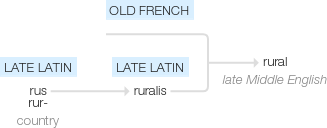Rural
late Middle English: from Old French, or from late Latin ruralis, from rus, rur- ‘country’.
wiktionary
From Old French rural, from Latin rūrālis(“rural”), from rūs(“countryside”) + -ālis.
etymonline
rural (adj.)
early 15c., of persons, "living in the countryside," from Old French rural (14c.), from Latin ruralis "of the countryside," from rus (genitive ruris) "open land, country" (from PIE *reue- (1) "to open; space;" see room (n.)).
In early examples there is usually little or no difference between the meanings of rural and rustic, but in later use the tendency is to employ rural when the idea of locality (country scenes, etc.) is prominent, and rustic when there is a suggestion of the more primitive qualities or manners naturally attaching to country life. [OED]
By 1510s as "characteristic of country life generally, rustic. Extended senses in 15c. included "lowly, unlearned, uncouth, unpretentious, unpolished;" the overal sense of "characteristic of the country, as opposed to the town," is by 1580s.
As a noun, "a country person, a peasant" mid-15c. Related: Rurally; ruralism; rurality. Wordsworth uses ruralize "give a rural character to," but ruralization was used from 1859, of persons, in the sense of "a going into the country."
